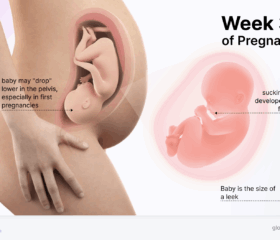Nesting During Pregnancy: What It Is and When It Starts
Do you suddenly have an overwhelming urge to clean, organize, and prepare your home? This common pregnancy phenomenon has a name—nesting.

What exactly is nesting, and when will this instinct kick in? Will the non-pregnant parent also nest, and what should you look out for when you do it? Read on to find out.
What is nesting?
Nesting is an instinctive behavior. As the name suggests, it consists of preparing your home, or “nest,” for your baby’s arrival. When this instinct kicks in, you’ll feel a surge of energy and a strong desire to create a clean, organized, and safe environment for your little one. 1
Nesting goes beyond simple tidying. You’ll probably want to do everything you can to create a welcoming space for your baby, such as stocking the fridge or decorating the nursery. Nesting can also involve mentally preparing for parenthood and the changes it’ll bring.
This isn’t just a human experience; many animals, like birds and hamsters, also nest before giving birth. Some people believe that nesting is linked to hormonal changes during pregnancy, but there isn’t any real research backing this claim, and we don’t really know what causes it. 2
When does nesting begin?
The exact time that nesting kicks in varies from person to person and even pregnancy to pregnancy, but it typically begins during the third trimester, in the weeks leading up to the due date.
This timing makes sense—this is when the reality of your baby’s arrival will usually sink in. Some women feel more “ready” after nesting, and, indeed, go into labor soon after. Here again, there isn’t any hard scientific evidence that links nesting to the start of labor, so it isn’t clear whether there’s an actual relationship there. 3
Don’t worry if you don’t feel the urge to nest at all. It doesn’t reflect on your readiness or ability to be a parent. In fact, the same mom might go all out with nesting in one pregnancy and feel no desire to do so in the next.
What are the signs of nesting?
Because nesting is just a description of a behavior and not an actual medical symptom of pregnancy, there’s no universal list of signs that mean it’s started.
However, if you show these signs, it’s probably safe to say you’re nesting (rather than just tidying the house as you normally would):
- Obsessive cleaning and organizing: You might find yourself scrubbing floors, disinfecting surfaces, and reorganizing drawers more intensely than ever before.
- Stocking up on supplies: Some nesting moms suddenly feel the need to stock up on diapers, wipes, baby clothes, and other essentials. That might still happen even if you already had an ample supply.
- Nursery preparation: Setting up the crib, painting the walls, and arranging baby clothes in the closet may become your top priorities.
- Meal prepping: Nesting moms often feel the urge to cook and freeze meals for the postpartum period.
All of these things are worth doing, so as long as they don’t become compulsions, there’s nothing wrong with giving into your impulses. Some women report that nesting coincides with a slowing of their social lives—when you nest, you might prefer to stay home preparing your space instead of socializing.
Will your partner nest, too?
While nesting is mainly associated with pregnant women, anecdotally, it seems that non-birthing partners can also get caught up in the preparations. You might find that your partner starts fixing things around the house to make sure everything is in perfect condition.
Nesting just hasn’t been studied very thoroughly, so the jury’s out on whether all of this is caused by ingrained instincts or whether people who actively “nest” are just thoughtful, conscientious parents. Regardless, if your partner wants to nest, too, just embrace the extra pair of hands.
What to do when you nest
If you want to nest, go for it. Take advantage of the energy (and time!) you have now to get things done. Your hands will likely be full once your baby arrives.
Be sure to focus your energy on worthwhile tasks. Create a list of things that will actually make your life easier when your baby is here.
Consider bumping these to the top of your to-do list, above even cleaning:
- Preparing freezer meals: Having ready-made meals on hand will be a lifesaver in the first few weeks after you give birth.
- Packing your hospital bag: You’ll also want to make sure you’ve packed everything you need for labor, delivery, and your hospital stay beforehand. The last thing you want to do when you’ve started contracting is to scramble around to find missing items.
When it comes to cleaning, it can help to focus on a single area (e.g., the nursery or the kitchen) at a time. Doing so can make the job less overwhelming.
Don’t be afraid to delegate
Ask your partner, family, or friends for help if you need it. As you’ll soon realize, some tasks can be hard to do on your own when you’re in the late stages of pregnancy.
While you’re at it, plan out your support, rest, and self-care after your baby arrives. Hammer out what you’ll do and what you’ll ask other people to help with.
What to avoid doing when you nest
While nesting can be very productive, you need to be careful about your safety. Avoid:
- Lifting heavy objects: Ask your doctor how much you can lift when you’re pregnant (preferably before you pick up the couch to vacuum under it). It’s also important to protect your back and avoid straining yourself.
- Climbing ladders or furniture: Ask someone else to help you with chores that require being in high places. Falling is very dangerous for a pregnant woman in her third trimester.
- Using harsh chemicals: Use natural cleaning products and let fresh air into the room so you don’t breathe in any chemicals that could harm you or your baby. You’ll want to avoid certain products, like some paints, aerosols, and carpet cleaners, as they can be hazardous. 4
- Overworking: Take regular breaks and stay hydrated (you need to drink a lot of water when you’re pregnant). 5 Don’t push yourself too hard and put your health at risk.
- Striving for perfection: Don’t stress out and get too fixated on small details. The perfect home for your baby is one that’s filled with love and care, not necessarily one that’s perfectly clean (and even if it’s spotless on day one, it won’t stay that way for long).
When does nesting become unhealthy?
Nesting is generally a positive and productive experience. However, it’s possible to get carried away with it, particularly if you’re prone to anxiety or compulsive behavior.
If nesting is stressing you out, disrupting your sleep (i.e., causing pregnancy insomnia), or distancing you from your partner, you should talk to your doctor. They’ll help you deal with the root of the problem, even if that just means helping you calm down and breathe a little.
Final thoughts
Count it a blessing if your nesting instincts are kicking in. After your baby comes, it might be a while before you feel as energetic as you do now.
When you’re soothing your little one in a clean, organized, and well-stocked home, you’ll be grateful for all the work you did weeks before.
Article Sources
- American Pregnancy Association. "Nesting During Pregnancy" Retrieved April 29, 2025.
- Women's Studies International Forum. "Nesting behaviours during pregnancy: Biological instinct, or another way of gendering housework?" Retrieved April 29, 2025.
- MedlinePlus. "Am I in labor?" Retrieved April 29, 2025.
- KidsHealth. "Using Household Chemicals During Pregnancy" Retrieved April 29, 2025.
- MedlinePlus. "Pregnancy and Nutrition" Retrieved April 29, 2025.







